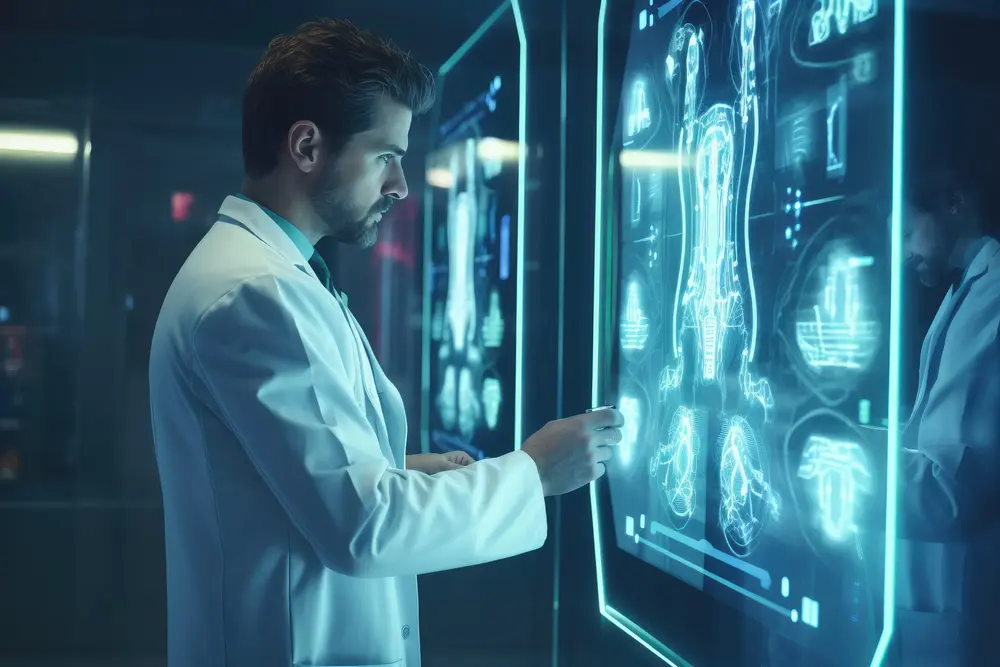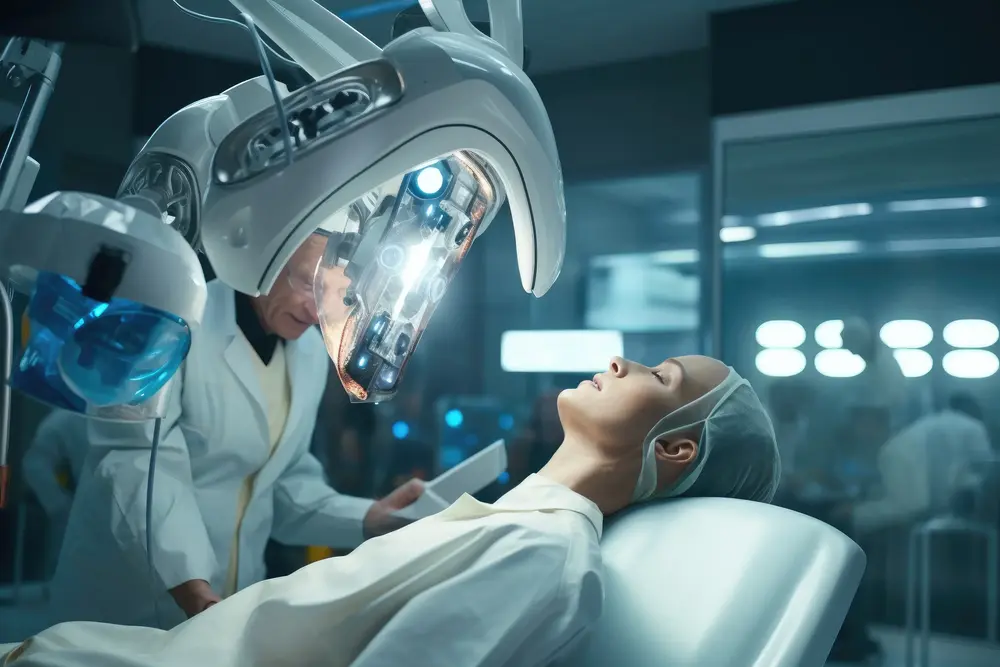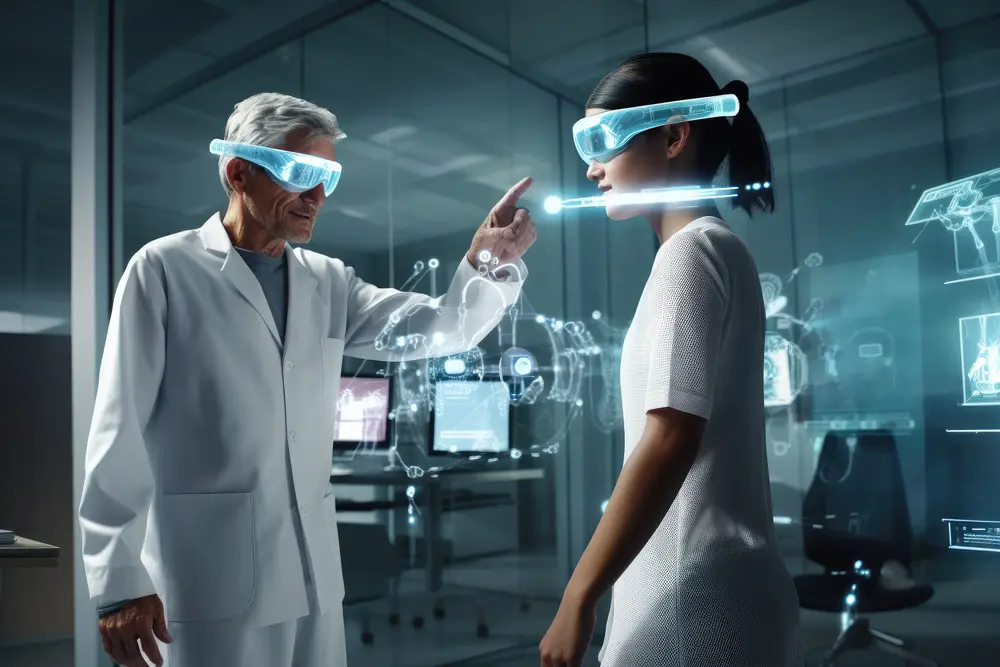AI is revolutionizing healthcare by significantly improving the accuracy and speed of diagnostics. With the ability to analyze vast amounts of data in a fraction of the time it would take a human to do so, AI algorithms can identify patterns and potential health issues with greater efficiency.
How AI is Transforming Diagnostics and Treatment
AI is revolutionizing healthcare by significantly improving the accuracy and speed of diagnostics. With the ability to analyze vast amounts of data in a fraction of the time it would take a human to do so, AI algorithms can identify patterns and potential health issues with greater efficiency. This has led to earlier detection of diseases, more personalized treatment plans, and ultimately better outcomes for patients. As technology continues to advance, AI will likely play an even larger role in the future of diagnostics and treatment in healthcare.
Let us explore the evolving role of artificial intelligence in the healthcare sector.
Introduction to AI in Healthcare
AI and its significance in healthcare:
AI in healthcare is used to make diagnostics better, personalize treatment plans, speed up drug discovery, and improve patient outcomes. By using AI in healthcare, it can become more efficient, accurate, and accessible, changing patient care and medical research.
Major areas where AI in healthcare is already making a difference are:
AI is changing healthcare for the better. It helps find diseases early with advanced imaging. It personalizes treatment plans and improves patient care with virtual health assistants and telemedicine. This makes healthcare more efficient and accurate.
1. Diagnostics and Medical Imaging

AI in Radiology:
AI in radiology helps doctors find health problems in medical images with great accuracy. It can find issues like cancer early. This technology also makes the process faster by automatically reading the images. This means less work for doctors and makes sure the results are always right. This helps patients and makes the whole process smoother.
Case studies of successful AI applications in diagnostics:
AI in healthcare has greatly affected the field of diagnostics. For example, Google’s DeepMind can detect eye diseases from retinal scans, IBM Watson can identify rare cancers through analyzing genomic data, and Zebra Medical Vision’s AI algorithms can accurately diagnose conditions from X-rays and CT scans. This has improved the accuracy and speed of medical diagnostics.
2. Predictive Analysis for Disease prevention

Early Detection: Using AI to predict and prevent diseases:
AI helps find diseases early by looking at a lot of health information to see patterns and predict risks. It uses tools like predictive analytics and machine learning to predict conditions like diabetes, heart disease, and cancer. This lets doctors act early and give personalized care to stop problems before they start. This helps patients get better and saves money on healthcare.
Case study of predictive models in chronic disease management:
In chronic disease management, predictive models such as Kaiser Permanente’s AI tools for forecasting diabetes onset, Cleveland Clinic’s machine learning algorithms for predicting heart failure, and Partners HealthCare’s models for anticipating COPD exacerbations enhance early intervention, tailor treatments, and improve patient outcomes through precise, data-driven healthcare strategies.
3. Personalized Medicines and Treatment Plans

Customized care by AI for individual patients:
AI in healthcare tailors treatments by analyzing patient-specific data, including genetics, lifestyle, and medical history. This personalized approach optimizes therapy plans, such as targeted cancer treatments and individualized medication regimens, ensuring higher efficacy, reduced side effects, and improved patient outcomes through precision medicine.
Genomics Integration: The role of AI in developing personalized therapies based on genetic information:
AI in genomics uses genetic data to find mutations linked to diseases. This helps create personalized treatments. By predicting how individuals will respond to treatments and guiding drug development, AI-driven genomics supports tailored interventions. This improves treatment effectiveness and reduces side effects. Ultimately, it advances precision medicine and individualized patient care.
4. AI in Drug Discovery and Development

Accelerating research in the drug discovery process:
AI speeds up finding new drugs by quickly studying large amounts of data to find possible drug options, predict how well they might work, and improve their molecular structures. This saves time and money, makes preclinical testing easier, and improves the development of effective, precise treatments. This speeds up the time it takes for drugs to go from the lab to the market.
Case study of AI identifying new drug candidates:
AI has found new potential drugs. For example, Insilico Medicine’s algorithms found possible treatments for fibrosis, Atomwise’s AI predicted compounds for Ebola and multiple sclerosis, and BenevolentAI’s platform discovered a promising ALS drug. These show how AI can speed up and improve the drug discovery process.
5. Enhancing Robotic Surgery

Precision and accuracy of AI-assisted robotic surgery:
AI-powered robotic surgery improves accuracy and precision by analyzing real-time data and providing guidance. This reduces errors and allows for less invasive procedures, leading to better surgical outcomes, faster recovery, and fewer complications. These advancements in medical technology represent significant progress in patient care.
Successful surgical outcomes with AI:
Notable advancements in AI-assisted robotic surgery include improved imaging, real-time analysis, and better dexterity. These innovations have resulted in successful outcomes such as faster recovery, less scarring, and greater precision in complex procedures. As a result, surgical practices and patient care have been significantly improved.
6. Virtual Health Assistants and Telemedicine

AI in healthcare chatbots as virtual assistants in patient care and management:
It acts as a virtual helper in patient care. They provide 24/7 support, answer medical questions, schedule appointments, and give personalized health advice. They improve how patients get involved, simplify administrative tasks, and make it easier to get care. This makes healthcare more effective and available.
Remote healthcare uses AI in telemedicine and patient engagement:
AI improves remote healthcare by making telemedicine more effective. It does this by providing accurate diagnostics, personalized treatment plans, and continuous patient monitoring. AI also helps patients stay involved in their healthcare by using interactive platforms to provide timely support. This makes healthcare more accessible and efficient, especially for people in remote areas or with limited access to healthcare.
Ethical and Legal Considerations
Data Privacy
Protecting patient information in AI applications:
To protect patient information in AI applications, it’s important to use strong encryption, control access tightly, and follow rules like GDPR and HIPAA. More advanced methods, like anonymization and secure data storage, also help keep data safe. This builds trust and ensures privacy while still allowing AI to bring benefits to healthcare.
Bias and Fairness
Ensuring equitable AI healthcare solutions:
To ensure that AI in healthcare solutions is fair and unbiased, it is important to use diverse data sets, transparent algorithms, and ongoing evaluation. By incorporating fairness guidelines and ethical standards, we can prevent discrimination and ensure that AI systems provide accurate and unbiased care for all patients, regardless of their race, gender, or socioeconomic status.
Emerging Trends and Future Directions

AI in mental health, wearable technology, and remote monitoring:
AI is used in mental health through apps like Woebot for CBT and wearable technology that tracks vitals for real-time health insights. Remote monitoring systems, such as AI-driven platforms for chronic disease management, improve patient care by providing continuous, personalized health data, which helps with early detection and intervention.
Research and Development: The future landscape and ongoing research initiatives:
The future of AI in healthcare involves using advanced technology to predict health issues, create personalized treatment plans, and improve medical testing. Ongoing research is focused on improving AI programs, combining AI with genetic information, and creating wearable devices. The goal is to improve patient care, simplify medical processes, and develop new treatments and prevention methods.
Encouraging stakeholders to innovate while maintaining ethical standards
Let’s innovate responsibly in AI healthcare. Stakeholders must prioritize ethical AI in healthcare development, respect patient privacy, and mitigate biases. By fostering collaboration, transparency, and adherence to ethical guidelines, we can harness AI’s full potential to revolutionize healthcare while ensuring equitable access and maintaining trust in technology.
Wrapping up
In conclusion, using AI in healthcare is not just a promising trend but a necessary change. AI’s exceptional accuracy, efficiency, and accessibility are reshaping how we provide medical care, diagnose, and treat patients. By using AI, we can greatly reduce human error, improve patient outcomes, and ensure high-quality healthcare is available to everyone, no matter where they are or their economic status.
As we stand on the brink of this new era, the potential benefits of AI in healthcare are too significant to ignore. Healthcare professionals and institutions must embrace this technology to provide the best possible care and stay ahead. It is our responsibility to support and speed up the use of AI in healthcare making sure it is ethical, fair, and beneficial for all.
The future of healthcare is here, and it is intelligent, compassionate, and innovative. By embracing AI, we are not just improving healthcare; we are revolutionizing it for the betterment of humanity. Let’s move forward with confidence and commitment, knowing that with AI we can create a healthier, more efficient, and more inclusive world.
FAQ’s
1. What is AI in healthcare?
AI in healthcare refers to the use of artificial intelligence technologies, such as machine learning, natural language processing, and robotics, to improve medical diagnosis, treatment, patient care, and healthcare administration.
2. Who is the father of AI?
John McCarthy is widely regarded as the father of artificial intelligence. An American computer scientist, McCarthy, coined the term “artificial intelligence.”
3. Can AI in healthcare replace doctors?
AI cannot replace doctors, but it can significantly augment their capabilities. AI serves as a powerful tool to enhance doctors’ efficiency and accuracy, allowing them to focus more on patient care and personalized treatment. Thus, AI and doctors complement each other, working together to improve healthcare outcomes.
4. Which other sectors can AI help in?
AI can help in finance, education, transportation, manufacturing, agriculture, retail, customer service, cybersecurity, entertainment, etc. Learn more about it in our business evolution with GenAI blog.




